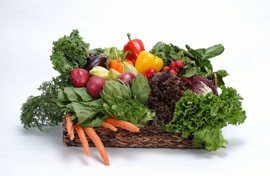Families have unhealthier diets than childless couples
Release Date 16 December 2010

Research by the University of Reading has found that couples with children have a poorer diet than those without.
On average, statistics showed that childless couples ate 2kg more fruit and vegetables than families over a fortnight.
The results formed part of a study that looked at the uneven distribution of unhealthy diets in the population. It also showed that regional variation in the demand for fruit and vegetables is pronounced, with the highest demand in London and the South East and the lowest in Scotland and Northern Ireland.
Professor Richard Tiffin, Director of the Centre for Food Security at the University, said: "There are clear distributional implications for dietary health that arise from these patterns of consumption and also for the health of children. They suggest that targeted interventions are necessary in order to reduce the incidence of diet-related health problems in the future."
The study revealed that the presence of children in a household leads to a lower level of demand for fruit and vegetables and meat, and an increased demand for milk and dairy, cereals and potatoes.
The results also emphasised the role played by low incomes and socio-economic circumstances in poor dietary choices. Comparing an unemployed individual with an otherwise identical individual living in a household of two, the former consumed over 3kg less fruit over a period of two weeks. Similarly, for two identical households, a difference in income of 10 per cent can be expected to lead to a difference in demand for fruit and vegetables of around 500g.
Professor Tiffin said: "Our results imply that households which have a higher level of expenditure will tend to consume proportionately more meat and more fresh fruit and vegetables. Households in London and the South East have higher levels of fruit and vegetable consumption while it is reduced by the presence of children.
"The dietary components that we have analysed have important implications for policy-makers in tackling diet-related chronic disease, which represents one of the most significant public health challenges of the 21st century."
ENDS
For more information please contact Rona Cheeseman, press officer, on 0118 378 7388 or email r.cheeseman@reading.ac.uk
Notes to editors
The paper, ‘The demand for a healthy diet: estimating the almost ideal demand system with infrequency of purchase, by R. Tiffin (University of Reading) and M. Arnoult (Scottish Agricultural College), is published this month in The European Review of Agricultural Economics - http://erae.oxfordjournals.org/content/current
Researchers used the UK government's Expenditure and Food Survey (EFS) for 2003-2004. Participating households voluntarily record food purchases for consumption at home for a two-week period using a food diary. The sample is based on 7,014 households in 672 postcode sectors stratified by Government Office Region, socioeconomic group and car ownership. It is carried out throughout the UK and throughout the year in order to capture seasonal variations.
The Centre for Food Security joins together existing areas of research excellence at the University to provide a platform for real-world research around this globally important issue. The Centre is structured around three interconnected strands of research: Diet and health, Sustainable agriculture and Biodiversity
Research in the Centre draws together expertise from a broad range of disciplines including: agriculture, policy and development; food and nutritional sciences, horticulture; human and environmental sciences; psychology; economics and meteorology.
